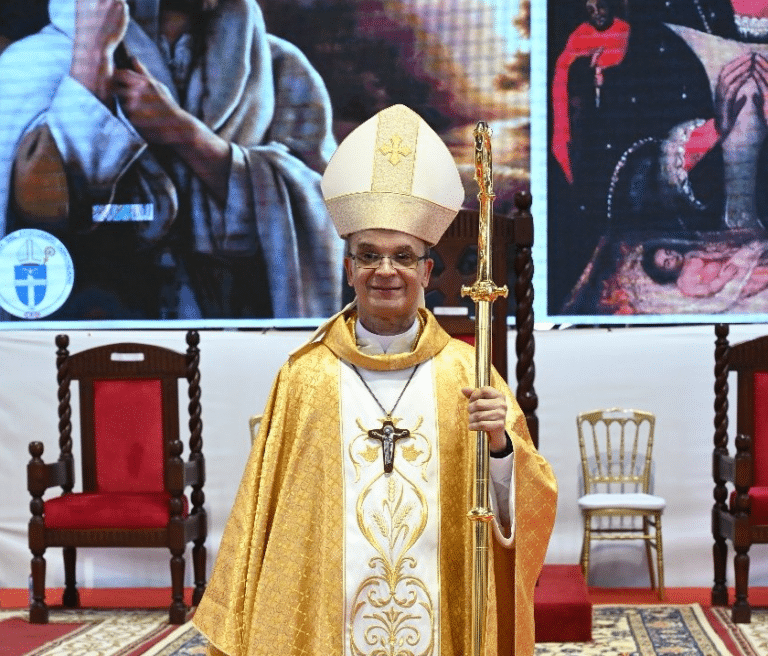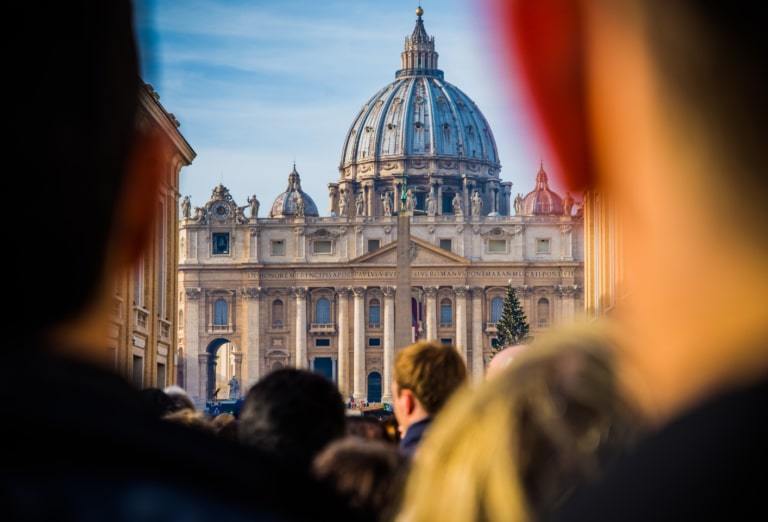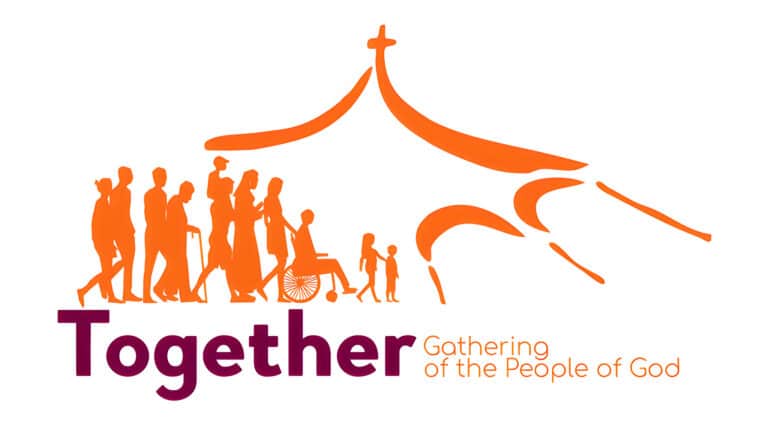Silence filled the room as we waited, somewhat apprehensively. Cardinal Mario Grech was about to arrive [1]. He was coming to be the guest of that week’s community night for us at the Lay Centre, where an international, intergenerational, and interreligious group of around 20 students from the different Pontifical Universities in Rome live and share this moment of their lives in the Eternal City together. It was the first time (and the only one so far) that he would be with all of us, presiding over mass and joining us at the dinner table.
As soon as he stepped into the room, it was clear that he came with a certain gravitas. His presence couldn’t be missed with such a joyful smile and the light atmosphere he exuberated. He immediately made all of us feel at ease.
During Holy Mass
A surprise came at the end of the gospel reading when the homily was supposed to start: silence again, but without apprehension this time. There, he stayed in quiet contemplation for a decent amount of time, and so did we, in a rather organic way. The silence was only to be broken when he finally suggested: “Why don’t we try out a synodal experiment here? You know, from time to time, it is good for the preacher to be also preached at…” So he invited us to share some of our reactions to the Word of God we had just heard, “and then I can attempt to make a simple reflection at the end.”
Perhaps surprisingly – as we didn’t expect this move – it felt quite natural. Promptly someone started, followed by another, and then another, until most of us had briefly spoken. The first reading was from the Acts, on the presence of Paul in Athens. Next, we recited Psalm 148, proclaiming, “Heaven and earth are full of your glory.” The Gospel was from John,5 in which Jesus tells his disciples, “I have much more to tell you, but you cannot bear it now. But when he comes, the Spirit of truth, he will guide you to all truth.”
Inner restlessness
One of the first members of the community who spoke took up these very lines. He shared how consoled he felt by these words coming from Jesus, assuring us of the presence of the Holy Spirit to lead the way through uncertain times. When it was my turn, I said that these same lines had actually sparked a very different reaction within me. They made me feel restless as I realized how much there was that I “cannot bear now” [2], how much I don’t understand or that I simply doubt – and very deeply so – and wrestle with. I mentioned something about how perhaps I wished I had the same kind of trust as the person who had shared about the consolation these words gave him, but at that moment I just felt restless.
Some words from Pope Francis, with which I had been struggling for quite a few months before that moment, came to my mind, and I quoted them. He preached at the beginning of his pontificate to the Jesuit community at the Church of the Gesù:
to be a Jesuit [one can take it to mean a Christian as a whole] means to be a person of incomplete thought, of open thought: because he thinks always looking to the horizon which is the ever greater glory of God, who ceaselessly surprises us. And this is the restlessness of our inner abyss. [3]
This was the source of my inner restlessness: I felt incomplete because there was just so much that I “could not yet bear.”
To my surprise, in his closing reflection, Cardinal Grech responded to this as he tried to establish some parallels between our reactions and the call for synodality. Shifting from Italian to the English word I had used, he asked: “Restlessness, no?” He looked at me, emphasizing, “You know, this restlessness is a gift and one that we ought to cultivate more.”
A gift? I was surprised at the idea
This totally flipped the way I was looking at my experience. Previously, I was annoyed that I didn’t feel the same consolation that my friend did, so I was surprised at the idea that my negative reaction (as I first perceived it) could be, in fact, a gift? And one that “we ought to cultivate more”?
Indeed, Cardinal Grech assured us that only this deeply felt restlessness that can open us to the gift of the Holy Spirit, to welcome his surprises, to embrace his new paths.
“Jesus throws us into crisis”, Pope Francis underscores, “we should be worried if he does not throw us into crisis, because we might have watered down his message!” [4] The Holy Father continued this is why he asked the officials of the Roman Curia at the end of his Christmas address in 2020, the year in which the pandemic put the whole world into a deep crisis, to “please, continue to pray for me, so that I can have the courage to remain in crisis.” [5]
Underneath too strong a sense of security or certainty there might be a rigid heart, whose faith is, in fact, paralyzed. Echoing Pope Francis’s usual words, Cardinal Grech then insisted that we watch out for those “perfect Christians” who think they have an answer for everything.
If one has the answers to all the questions—that is the proof that God is not with him. It means that he is a false prophet using religion for himself. The great leaders of the people of God, like Moses, have always left room for doubt. You must leave room for the Lord, not for our certainties; we must be humble. Uncertainty is in every true discernment that is open to finding confirmation in spiritual consolation. [6]
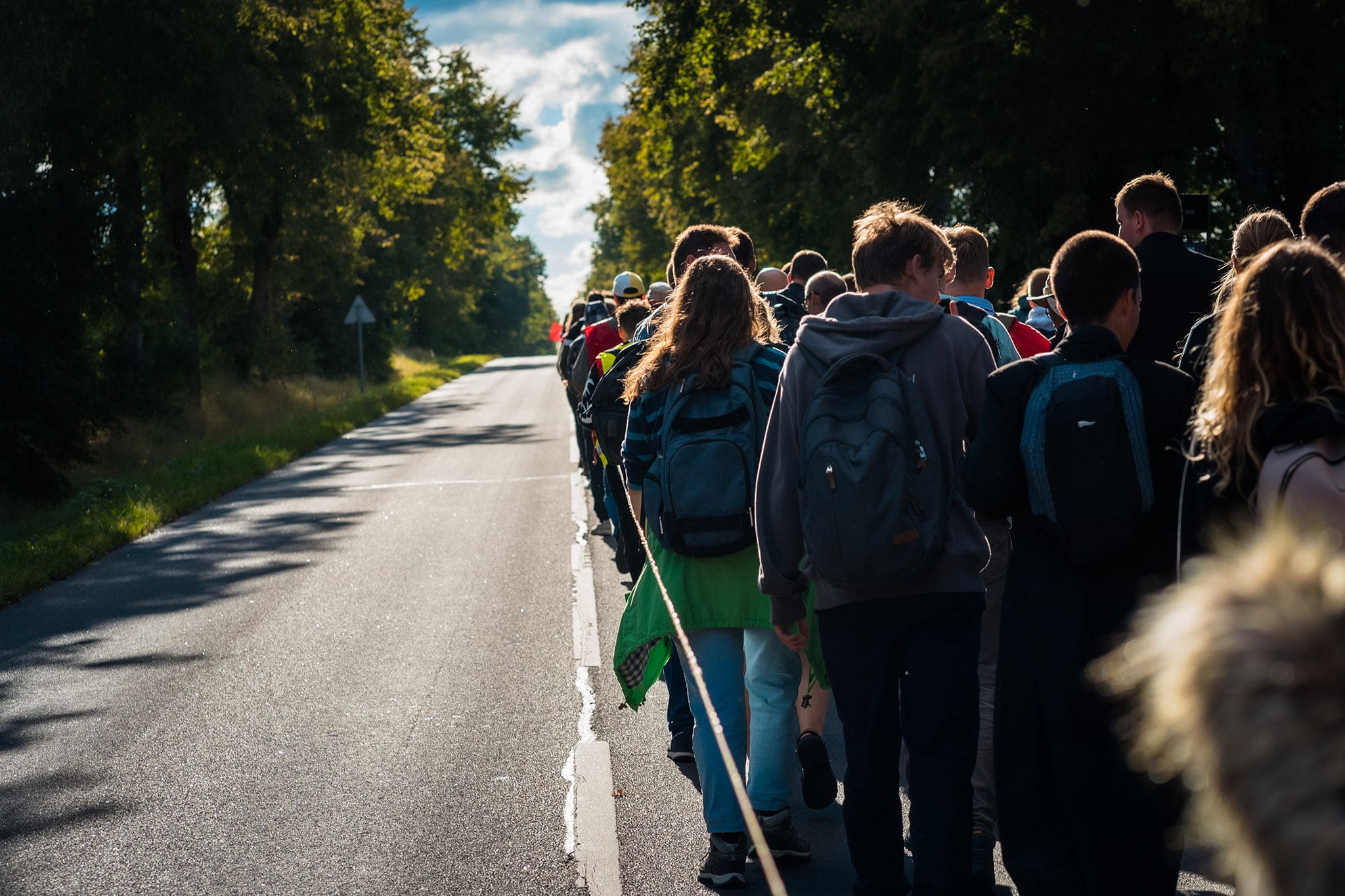
Ecclesial restlessness
Cardinal Grech then moved on in his closing reflection for the “homily” with us at the Lay Centre to highlight how the call to cultivate this restlessness is not only something that each one of us ought to take on personally, but also something that the Church as a whole must learn to better cultivate together, including from an institutional perspective.
Indeed at the core of what Pope Francis’ call for synodal conversion means: a Church that rejects the temptation of triumphalism into which we have often fallen throughout history and honestly recognizes that we simply do not have the answers for everything [7]; that some of the answers we gave in the past were gravely wrong and thus demand serious repentance [8]; and – perhaps most crucially now – a Church that intentionally opens itself up to the reality that some of the answers we now give are, at the very least, not the best – if not profoundly damaging [9]. At the end of the day, the call for synodal conversion is the call for a Church ever more fully aware that there is so much we still have to learn, that there is “so much we cannot yet bear” (Jn 16:12) – and that the restlessness that comes from such an incomplete thought is the only attitude that can set us on the path towards “all truth”, open to the guidance and surprises of “the Spirit of truth” along the way of history.
This involves being open to truly learning from others – something that takes serious listening, dialogue, humility.
“Letting go of the need to always be right”
It takes “letting go of the need to always be right” – and, once again, both personally and as a Church – a realization that sank in for me during a deep conversation I had about what synodality means with one of the good friends I’ve been blessed enough to have here in Rome, Harriet. She was telling me how she worked out what the synodal call meant to her personally in her daily life.
She mentioned, for instance, how initially in our new job at the Vatican Dicastery for Promoting Integral Human Development, when someone asked her opinion on something, out of fear of being wrong, she would give the most diplomatic reply possible, pondering the various alternatives at hand in order not to compromise herself. But it was really only when she let go of the necessity of being in the right and allowed herself to express the position, she honestly held that she became most helpful and appreciated in the collaborative tasks at hand. It allowed her to put her creativity to use, and even if this approach would sometimes lead her to individually go down a wrong path, needing to revert course later, it was only by embracing this vulnerability that she was able to truly help the whole team to find the best path at the end of the day.
My experience at the Schoenstatt Pentecost Congress
Cardinal Grech’s visit to the Lay Centre was also particularly significant to me because iiit was then, right after dinner, that he confirmed that I could come to participate in the work at the Secretariat of the Synod. My interview with him and Sr. Nathalie had been less than a week before this visit. The weeks immediately after that visit were also memorable, as I traveled first to the United States for my commencement ceremony at Harvard and then to Germany to participate in the Pentecost Congress in Schoenstatt. These were both deeply synodal experiences, which renewed within me – as I look back at them now – an inner freedom that I had longed struggled to find over the preceding months.
Where did this inner freedom come from? I remember leaving the Pentecost Congress deeply grateful for the gift of having been used as an instrument for something important – which I, in fact, deeply cared about – and greater than myself. I remember speaking with Fr. Alexandre Awi Mello, ISch afterwards and sharing that the key phrase that came to me as I pondered the Congress was that of Pope Francis in Evangelii Gaudium: “The whole is greater than the sum of its parts.” [10]
Having joined the group that helped draft the final letter sent to the whole Schoenstatt Family by the 2022 Pentecost Congress was certainly a gift but also very frustrating at times. The nights without sleep were no struggle at all compared to having to incorporate into the final synthesis insights coming from the whole group, with which, in a few cases, I personally couldn’t disagree more. But this tension pointed precisely to where freedom was also to be found: the final letter wasn’t about me, it was about the Schoenstatt Family.
If I were to personally write it, I can assure it would be very different from the one we now have, but it would also lose its value, nature, and character.
The letter was not supposed to capture where I personally stood on the challenges affecting the Schoenstatt Family at this point in time but where the Schoenstatt Family as a whole stood. Through its representatives, the Schoenstatt Family spoke and took a position on where it now stands. As someone who belongs to this family, I was happy to also sign the final letter and give testimony to the discerned consensus we achieved, under the guidance of the Spirit. Overall, I am personally convinced that synodality, in consolidating a Church of the, and rather the, or, is the call from the Holy Spirit – through Pope Francis – for us to concretize today, in a very practical manner and with the whole Church, our Schoenstatt charism of “an organic way of thinking, living, and loving”. [11]
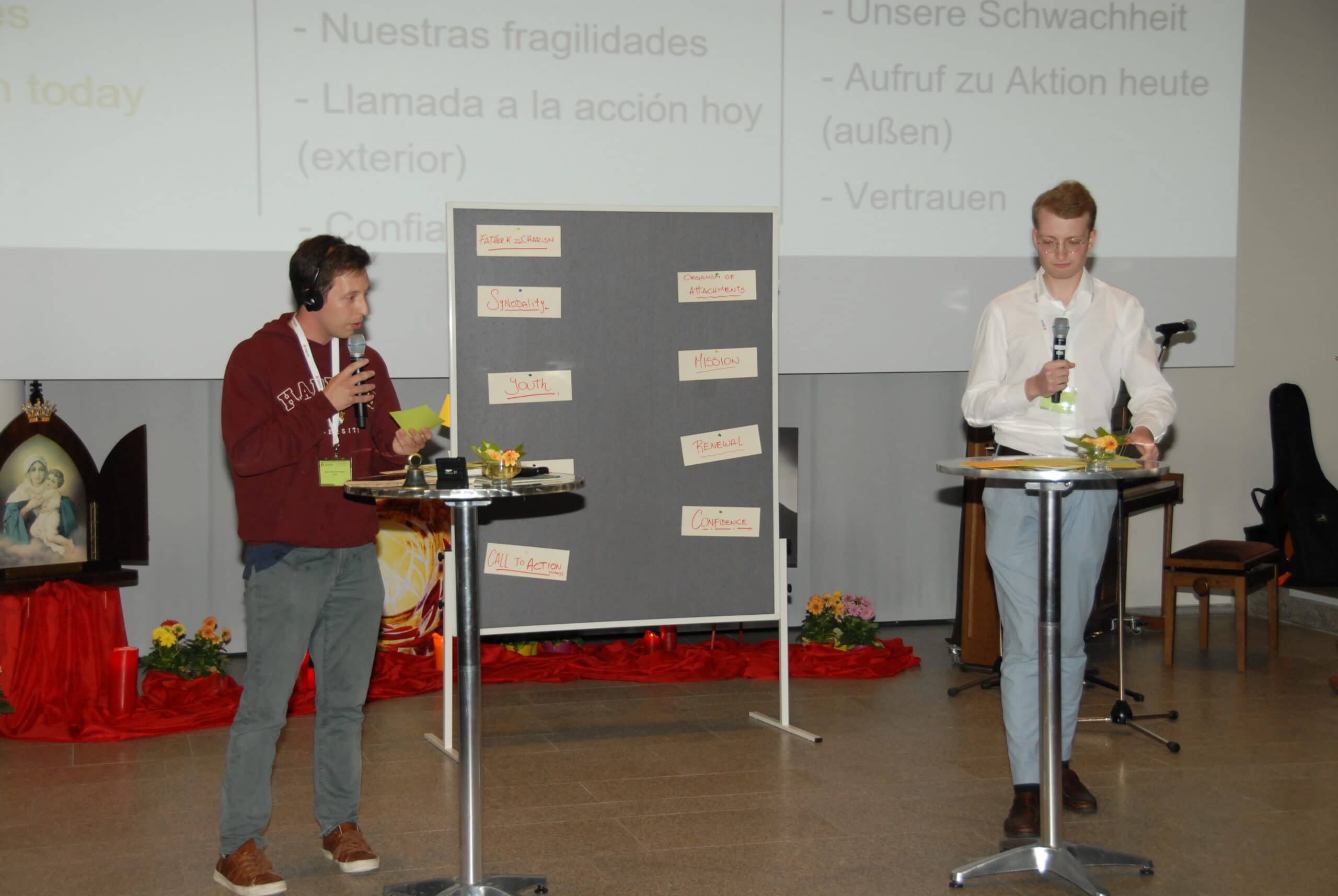
The Pentecost Congress and the Synod’s continental document
I am particularly grateful for how the Pentecost Congress, as a profound experience of synodality within Schoenstatt, prepared me for a similar experience of synthesizing discernment in which I was fortunate to participate at the level of the whole universal Church: the two weeks of retreat in Frascati in which a group of theologians and pastoral agents selected by the Secretariat of the Synod worked their way through all the reports from the first phase of consultation of the current universal synodal path in order to come to the first universal synod synthesis [12]. The final outcome was the document “Enlarge the Space of Your Tent” (Is 54:2) Working Document for the Continental Stage of the Synod, capturing the voices of the whole People of God from all over the world consulted during the first phase of the Synod. [13]
Much can be said about such a historical document, the source material, and the methodology that shaped it [14]. Having read most of the reports that arrived at the Secretariat of the Synod, I have to at least mention how touched – and changed – I was by the way in which people from literally all walks of life were willing to truly open up their hearts and their deepest joys and sorrows to actualize the synodal conversion to which Pope Francis calls the whole Church. Furthermore, I am impressed by the way in which the tent image – fruit of memorable personal conversations late into the night among us in Frascati – captures the dynamic of the “incomplete thought” that synodality demands: the tent, “which accompanied the people on their journey through the desert,” is “called to stretch out, therefore, but also to move” and its structure, with its cloths, ropes, and pegs, “must keep in balance the different forces and tensions to which it is subjected: a metaphor that expresses the need for discernment.”
Enlarging the tent requires welcoming others into it, making room for their diversity. It thus entails a willingness to die to self out of love, finding oneself again in and through a relationship with Christ and one’s neighbor.
[1] Cardinal Mario Grech, from Malta, is the current Secretary General of the Synod
[2] Jn 16:12
[3] Pope Francis, Homily, Holy Mass on the Liturgical Memorial of the Most Holy Name of Jesus, Church of the Gesù, Rome, Friday, 3 January 2014,
[4] Pope Francis, Angelus, St. Peter’s Square, Sunday, 22 August 2021
[5] Pope Francis, Christmas Address to the Roman Curia, Benediction Hall, Monday, 21 December 2020,
[6] Antonio Spadaro SJ, “Interview with Pope Francis”, L’Osservatore Romano, 21 September 2013
[7] On how an incomplete thinking with a dialogical mentality “is the opposite of triumphalist thinking”, see Diego Fares SJ, “Notes for an ‘Incomplete Thought’”, La Civiltà Cattolica, 4 Febf6.
[8] See, e.g., Christopher Kellerman SJ, “Slavery and the Catholic Church: It’s time to correct the historical record”, America, 15 February 2023
[9] See, e.g., Massimo Faggioli, “The Catholic Sexual Abuse Crisis as a Theological Crisis: Emerging Issues”, Theological Studies (Baltimore, 2019) 80 (3): 572–89,
[10] Pope Francis. Evangelii Gaudium Apostolic Exhortation of the Holy Father Francis on the Proclamation of the Gospel in Today’s World, 24 November 2013,
[11] See Elise Ann Allen, “Synod organizers sell process as cementing Catholicism as church of ‘both/and’”, Crux, 28 October 2022
[12] For a great inside account of what happened during these two weeks in Frascati, see Austen Ivereigh, “I helped write the first global synod document. Here’s what we heard from Catholics around the world.” America, 27 October 2022,
[13] See General Secretariat of the Synod, “Enlarge the Space of Your Tent” (Is 54:2) Working Document for the Continental Stage, Rome, October 2022,
[14] For a great account of this document, see Giacomo Costa SJ, “‘For A Synodal Church’: The Working Document for the Continental Stage”, La Civiltà Cattolica, 16 November 2022

